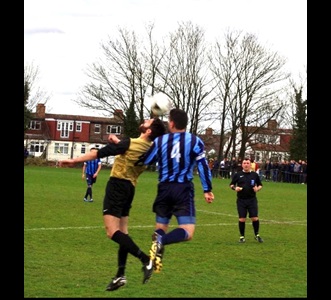
Respect the Ref
What’s Respect the Ref?
They work hard, train hard, show up and play hard – all to keep the game beautiful. They give their time and yet face negative attention and abuse in almost every match. Enough is enough. We can all play our part to show the ref some respect, to help make the game the best it can be. So, are you in?
find out more about respect the referee
We will be speaking with Amateur FA referees throughout the season in our series 'Who is the Referee?', as we get to know the people behind the whistle.
Jason Kilby, Level 5 Referee
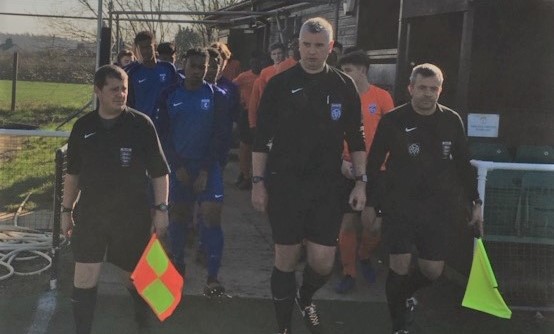
Why did you become a referee?
After playing Amateur FA football for Mayfield Athletic and Old Woodhouseians for 14 years, I was at the end of my competitive playing days, I had stood in as referee a number of times over the years and had an ok time. I was also keen to give something back to the game I enjoyed.
What has been your favourite refereeing experience?
Running the line in the FA cup. This season I participated in two rounds, the Extra Preliminary and the Preliminary, the furthest I’d ever been. As at best, an average park player I got nowhere near the FA cup. For the last few years I’ve done a load of games
What is the best thing about being a referee?
For me, it’s just like playing, you just don’t get to kick the ball. You get the adrenaline buzz, fresh air, pushing your fitness and where possible trying to walk off the pitch with 22 players who’ve had a great time.
In eleven years I had one game where I walked off questioning whether I wanted to be a Ref after the hassle I had to deal with. I’m probably a more hard nosed ref than average, I’m 6’5” and massive so I don’t get a lot of hassle, however, this one Sunday League game where lots of the players were trying to cheat and didn’t like me dealing with it was hard. Having said that, I now know I can deal with a lot that being a ref can throw at you.
What has being a referee given you?
I’ve got more cup final medals than space to put them. I’ve got the knowledge that I help facilitate football matches for lots of players each season. I’ve got new friends I wouldn’t have met before. There is often a strong brotherhood between refs, as we’re often in the same boat.
Do you see yourself as a role model for others who are looking to get into refereeing?
I try to be. Occasionally my friends outside of football mention a younger relative who has just started, I always try to help them where I can. I frequently talk about the how much fun refereeing is, and clear up the misconception that it’s always horrific.
What are your top three tips for being a referee?
I gave some advice to a referee I was observing for her promotion a few weeks ago, about always seeming to be in control of the situation, often players are looking to you for strength so at least make it look like you know what you’re doing.
Be strong and committed in your decisions, some players knowingly try to deceive you, some are just accidently wrong, be confident and firm.
Deal with the little things before they become big things. I have a no nonsense approach to dissent, if it’s clear dissent, use the sin bin. If it’s close to dissent, make sure you let the player know what is and isn’t acceptable. I speak to players throughout the game letting them know if a tackle is ok, but close to being a foul if they get it wrong, or close to a caution or dismissal.
If you could tell players, officials and spectators one thing, what would it be?
You generally get the referee you deserve. I may make a mistake with an offside or a throw in, but I make a lot less mistakes than the players do. If you expect a referee to be perfect on a muddy pitch at Firs Farm, then you’re playing the wrong game.
Daniel Smith, Level 4 Referee
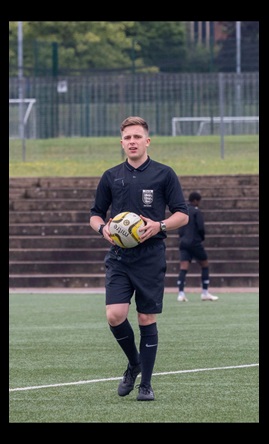
Why did you become a referee?
Initially it was similar to every other ref. I wasn’t the most naturally gifted footballer (putting it lightly!), but wanted to stay in the game, so at age 15 I took the course. It’s something that when I first started was a good earner on a Sunday, but it has now turned into something that is a massive part of my life, and I am loving the journey that I am on and the opportunities it has given me!
What has been your favourite refereeing experience?
There have been a number of experiences that come to mind. Straight away I think of games I did at the City Ground in Nottingham, St George’s Park, and the Iber Cup in Portugal. But my favourite experience is finding out I had received my promotion to level 4 in October. It is something that I had worked so hard for, and it was an extremely proud moment for me. As well as this, another highlight was definitely being awarded Amateur FA referee of the year. Another extremely proud moment, and one I cannot thank.
What is the best thing about being a referee?
The best thing, for me, about being a referee is getting to see the game from a different perspective. As well as this, the friends you gain and the relationships you build with fellow referees is something that I never expected when I first took the course, but it is something that is such a fundamental part of being a referee.
What has been your toughest moment in your refereeing career?
My toughest moment was when the first lockdown was initially announced, which meant I couldn’t receive my final observation and was therefore not promoted that year. Having worked so hard throughout the season, it was tough to take. However I learnt from the experience and I knew I didn’t want to feel that way again come the end of the following season, which motivated me even more.
What has being a referee given you?
Being a referee has given me extremely valuable skills. It has taught me how to work in difficult situations that require a calm but firm approach. It has taught me how to work well as part of a team, and key communication skills. It has also given me the opportunity to be part of a high level of football, visiting new grounds every week.
Do you see yourself as a role model for others who are looking to get into refereeing?
I wouldn’t say I am a role model, but I would definitely say I am someone who is there for new referees to turn to if they need any help or support in the early stages of their refereeing career. I myself am still learning and turn to people when I need advise or support, and I am thoroughly enjoying the journey I am on. I have gained valuable knowledge and experiences from refereeing so far, and would be more than happy to pass this on to other.
What are your top three tips for being a referee?
- Take on board any advice and tips that coaches and mentors give you. Having people tell you what you can be doing better is the best way to learn, and use it as a positive thing to help you develop.
- Go out and watch referees at your level, or the level you are aspiring to be at. Take on board what they do different and see if you can implement relevant parts of their game into yours.
- It’s a marathon, not a sprint! You won’t go out and referee a cup final in your first game! You will have great games, but also difficult games. Learn from everything, and always look to improve yourself. There is always room for improvement!
If you could tell players, officials and spectators one thing, what would it be?
We are people who love football too! We just have a different job on the pitch!
Dwayne Uylett, Level 5 Referee
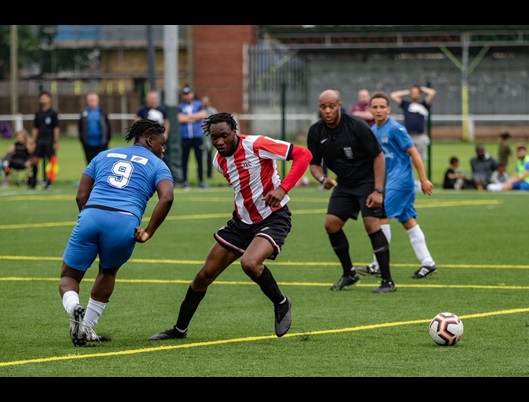
Why did you become a referee?
I became a referee in 2010. I decided to become a referee after having knee surgery, and told was told playing competitively consistently was no longer an option. I was also made redundant at the time from my work place and wanted to remain in football and do something that I enjoy.
What has been your favourite refereeing experience?
Refereeing has brought many so many experiences in my life, refereeing a game at Leyton Orient's Breyer Stadium, refereeing tournaments and having the chance to meet Avram Grant, Refereeing a charity game with Teddy Sheringham, but I have to say has to be my first game as a level 5 referee over at Nottsborough. A new Level 5 refereeing the top 2 clubs at the time in the SAL, brought me so much joy and happiness and an experience I will never forget.
What is the best thing about being a referee?
The best thing about refereeing is always being involved in the game. I have grown up in the game. Playing at what I say is a very good level, and getting injured was hard to take, but the release and enjoyment I get from staying in the game, keeps the fun element and happiness for me. Nothing beats Saturday afternoon going out to referee, wherever I am.
What is the best thing about being a referee?
The toughest part of refereeing came earlier this year when I was told I was not being nominated to be a Level 4 referee. As someone who suffers from anxiety disorder, the news put me in the darkest place I have ever been in refereeing, and subsequently my game dropped. I became anxious not knowing if I was good enough to even referee. This affected other areas of my life. This was hard to overcome, but I am now working harder than ever to ensure promotion to Level 4 is secured in the near future.
What has being a referee given you?
Refereeing has given me a purpose, a drive that I never had before. It enabled me to not only get fit, but work on my own issues. It challenges me mentally, thinking about things in different ways, even when I am not at a game, I am focused on certain incidents that may have taken place within the game and how I can improve. For me, I always want to improve, always want to be better, I actually want to be the best. So, refereeing has given me a focus a drive that, a confidence that I take into my everyday life especially at work.
Do you see yourself as a role model for others who are looking to get into refereeing?
I do see myself as a role model to young referees. When I was becoming a referee, I had no one to look up to, No one I could have gone to, but now seeing newly qualified referees, or people who are considering to be referees, I always try to act in a way that referees should act in, being professional at all times, helping them to learn from my mistakes and there's and also being there for them when they have difficult moments.
What are your top three tips for being a referee?
- Always be open to learning new things. I heard getting better never stops
- Refereeing doesn't keep you kit, You have to be fit to be a referee
- Go into every game looking to enjoy it. Players do it for enjoyment, why can't referees? Enjoy the first blast of the whistle, to the final 3 peeps.
If you could tell players, officials and spectators one thing, what would it be?
As a referee I would tell players, officials, and spectators, Have you made a mistake today, or do you think you will make a mistake, because I guarantee we all make mistakes every day. In a game of football, a manager might have got his tactics wrongs, players play the wrong pass. As a referee we all make mistakes, just like everyone in everyday life. So, think about the comment you are going to make to the human being.
Zoe Wheeler, Level 6 Referee
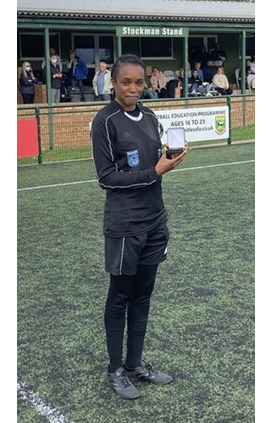
Why did you become a referee?
I loved football and I like refereeing because you can enjoy the game working by yourself or with a small team of up to 4 match officials.
What has been your favourite refereeing experience?
What is the best thing about being a referee?
What has being a referee given you?
Charlotte Dukes, Level 7 Referee
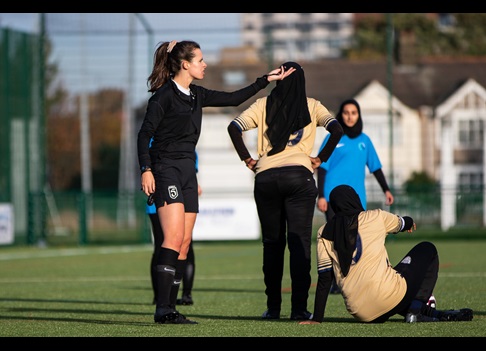
Why did you become a referee?
When I moved to London after university, I wanted to get immersed in the city's footballing community, joining the Victoria Park Vixens FC, an East London Grassroots team. Alongside playing, I wanted to challenge myself and try out refereeing as a means to get further involved in women's football, as well as taking a stride into an area that was still relatively underrepresented by women.
What has been your favourite refereeing experience?
After I qualified as a Level 7 referee, I reached out to Goaldiggers FC who kindly let me referee some of their pre-season friendly fixtures in 2019, and the rest is history. I genuinely believe the open and friendly nature of the Goaldiggers fixtures allowed me to build my confidence as a referee- those first fixtures can be very intimidating for someone trying to apply the Laws of the Game for the first time. Another highlight was refereeing for the newly formed Girls Super League during their Summer launch tournaments, to be able to officiate and be a visible role model for the girls was very rewarding.
What is the best thing about being a referee?
Refereeing has so many intricacies. From spotting the subtle points in the game that sped by your eyes and making critical game decisions in real-time - it's a real host of challenges every match. But equally these challenges are also the best thing about being a referee, you're pushed out of your comfort zone consistently and you improve as an official on the pitch, and in the transferable skills that refereeing equips you with off the pitch too.
What has been your toughest moment in your refereeing career?
Every match brings its challenges. I remember one particular women's cup game that required an above-and-beyond amount of match control, and by the end I was emotionally exhausted (but proud of myself for persevering). After the match, I reached out to my refereeing mentor to debrief on the game and that was incredibly helpful for me, having a community to lean on as a referee is a very powerful support mechanism.
What has being a referee given you?
The role itself is absolutely fascinating, as a referee I have become a better communicator, I've become much more assertive and I understand the quirks of the game better than I ever did before.
Do you see yourself as a role model for others who are looking to get into refereeing?
I think you can make a tangible difference both on and off pitch when you're a referee. Whether its being the only female official on the Hackney Marshes on Sunday, or officiating a girls cup final. By being present, being vocal and standing your ground, you're taking the steps in your power to be there for any girl, boy, man or woman who thinks they'd like to give refereeing a go.
What are your top three tips for being a referee?
1) Back yourself - you are qualified to be stood on that pitch and taking ownership of the match.
2) Trust the process - difficult games will provide you with a wealth of learning.
3) Enjoy seeing a completely new perspective of the beautiful game.
If you could tell players, officials and spectators one thing, what would it be?
Respect the ref. They love the game you're all playing too.
Alex Whiteman, a Level 6 referee

Why did you become a referee?
I became a referee because I wanted to stay involved in the game after I became too old to play. I know how much joy that playing gave to me so I wanted to give a little back to the game.
What has been your favourite refereeing experience?
My favourite experience and story is when I turned up to a AFA U15 representative game to be 4th official and an Assistant Referee was late so I filled in as the AR for the 1st half. At half time, the referee said that he had pulled his calf and asked me to fill in for the 2nd half. It was AFA v Sussex at Molesey. I really enjoyed refereeing the 2nd half.
What is the best thing about being a referee?
The best thing about being a referee? It’s a difficult question as there are so many positives. The first one that come to mind is that you are paid to keep fit. People pay large sums for Gym membership. A referee gets 90 minutes of exercise and then gets paid. Then you get to meet lots of people and talk about the game that you love.
What has been your toughest moment in your refereeing career?
The toughest moment was being chased around the pitch by a player. It’s a long story but he was 20 years younger than me but I was still quicker!
Do you see yourself as a role model for others who are looking to get into refereeing?
I’m not a role model just an average referee. I would say that, unless they are looking to get to the top, play the game into your late 30s and then pick up the whistle. That’s what I did.
What are your top three tips for being a referee?
My 3 tips are:- Sometimes less is more and the players can sort a problem on their own. Don’t get involved unless you have to. The 2nd tip is to remember that it is the players game. The 3rd tip is maybe a combination of the first two but it is that, if you come off the pitch and no one has noticed you, then you have had a good game. This is how I try to referee but sometimes the players will not allow me to do this.
Andy Demetriades, Level 5 Referee
Why did you become a referee?
I’ve played the game since I could walk. I love the game. My wife calls me “a proper football man”. When I stopped playing competitively in my mid thirties, I desperately missed it. I initially tried to fill that void by coaching youth football, but I was horrified to find biased Dad’s with whistles refereeing games. The game deserves better, so I decided to do something about it and so I qualified as a referee to give the kids a fair game.
What has been your favourite refereeing experience?
Refereeing the AFA Senior Cup final remains the highlight of my officiating career. It’s an appointment any AFA referee can only have once. Knowing this fact I was determined to enjoy every second of the day.
What is the best thing about being a referee?
The very best thing about being a referee is sharing the pitch with some wonderfully talented players. Watching a game unfold from the best vantage point on the park always gives me a buzz.
What has been your toughest moment in your refereeing career?
I referred an SAL game at the Hive in which one of the players broke his leg. It was a cold December afternoon and the poor lad lay shivering on the pitch for an hour until an ambulance finally got to us. Players safety is ultimately my responsibility and those 60 minutes were really tough.
What has being a referee given you?
Being a referee has given me the opportunity to stay involved in game I love from the bottom of my soul.
Do you see yourself as a role model for others who are looking to get into refereeing?
Nobody sets out to be a role model, but if my passion for the game and for refereeing inspires others to take up the whistle, then the game wins.
What are your top three tips for being a referee?
My top three tips would be
(1) Watch other referees as often as you can, take one thing they do well and incorporate it into you game.
(2) Be organised off the pitch with your admin
(3) Always referee the game, not the occasion.
If you could tell players, officials and spectators one thing, what would it be?
Walk a mile in my shoes before bestowing your pearls of wisdom.


